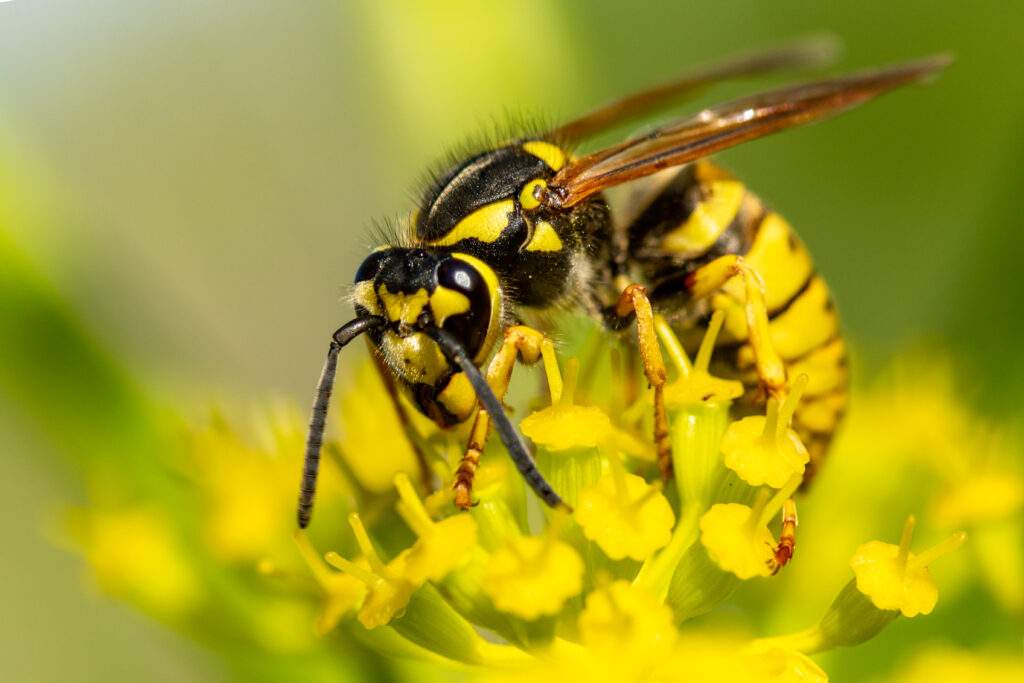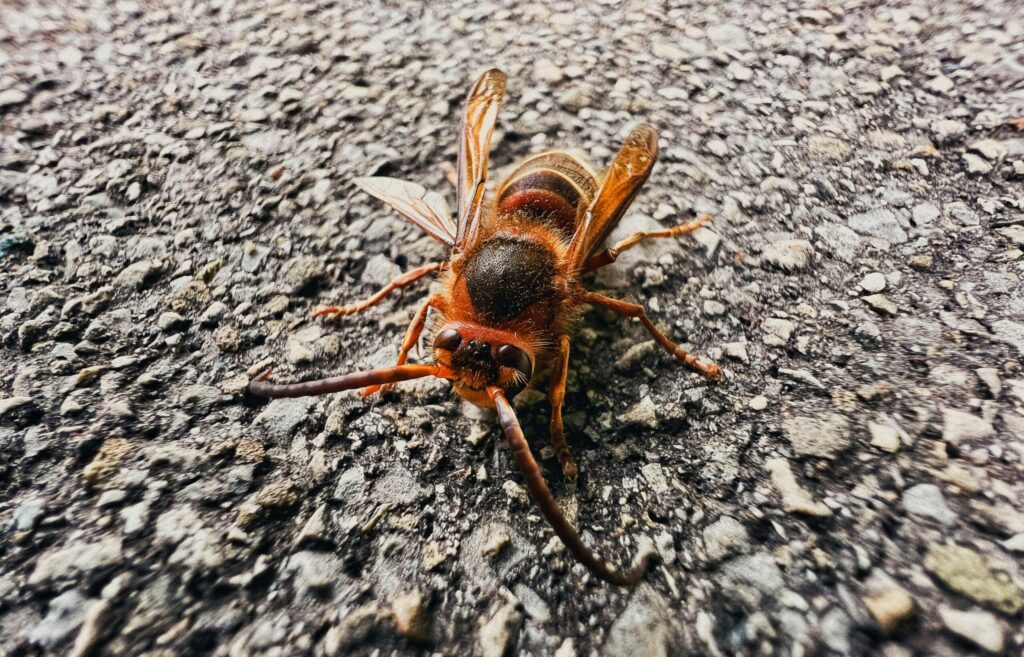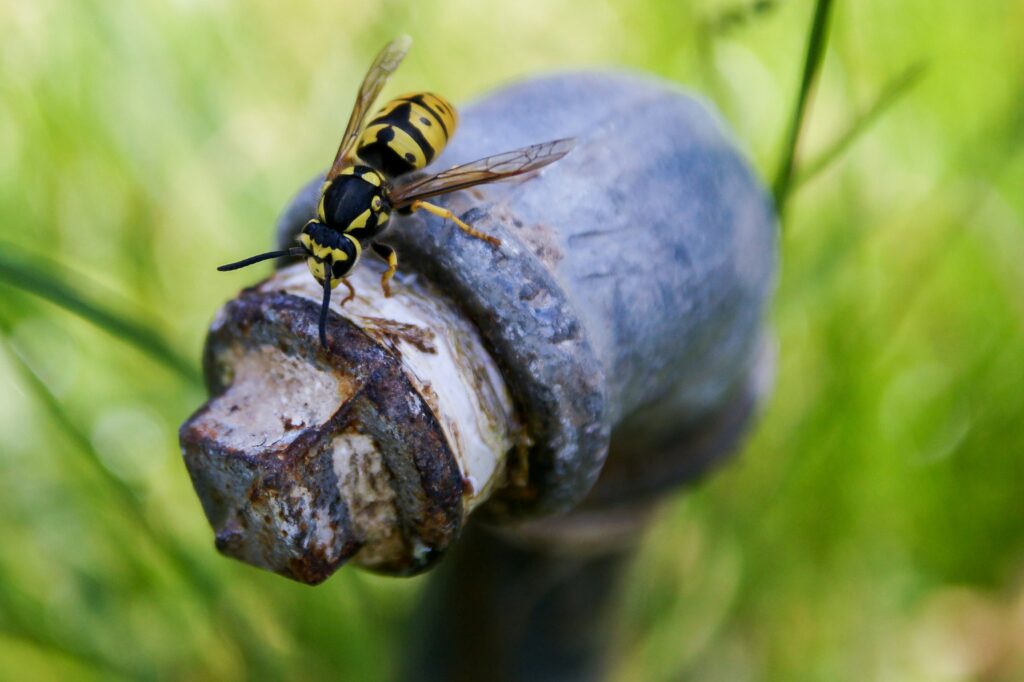Wasp control
- Home
- Wasps
Wasps can be a significant nuisance and potential hazard, especially during the summer months.
Effective control begins with knowledge of the different species of wasps and their behavior.

Wasp control
Fight
If you regularly suffer from wasp nests, we can place wasp traps preventively, before the season starts, so that the wasps are caught in time and the nuisance is limited.
Wasps live in colonies.
What's nice to know, the queen begins nesting on her own in the spring, around April.
A paper ball the size of a ping-pong ball.
She lays her eggs in it, from which the entire population is produced.
The population is at its greatest in August/September.
This is also the period when they like to eat sweets because of their high nutritional value.
This is also where the term lemonade wasp comes from.
They make their nest in a warm place where even at night the heat is well retained.
Often on the south side.
Or they make their nest in the ground, under sleepers and / or stones.

Hornet control
Hornets are a larger, more aggressive species of wasp that can cause significant nuisance.
We offer professional control to remove hornets effectively and safely.
* Yellow and black transverse mark on abdomen, head, thorax and first segment of abdomen reddish brown to dark brown.
Workers 1.6 to 2.5 cm long.
Dwarfs 2.1 to 2.8 cm.
Larvae white and legless.
* On the sides of the wasp head are large elongated facet eyes with three or so axial eyes at the top of the head.
In the hornet, the head is greatly widened behind the eyes.
* 2 solid side-moving jaws 9 mandibles ) with mouthparts underneath that allow the wasp to lick and suck.
2 pairs of transparent wings.
* Transition from thorax to abdomen strongly constricted.
* Complete shapeshifting.
* Late April eggs are deposited in ova, egg stage 7 to 12 days.
Larva stage 1 to 2 weeks.
Pupa stage 1 to 2 weeks.
Duration from egg to adult 3 to 5 weeks.
Males are born from the unfertilized eggs.
* In August/September, males ( drones ) and fertile females ( young queens ) emerge from the pupae.
These leave the nest to mate.
The drones die soon after mating.
* With the occurrence of the first night frost, the nest inhabitants die except the young queens.
* Protein and sugary foods are mainly needed to feed the larvae.
* The higher the air temperature, the more active the wasps.
A nest is built in a non - damp place, always above ground, diameter of 20 to 35 cm.
* Hornbees can be harmful to beekeepers.
( they sting the bee to death and then suck the honey from its stomach ).
* Hornbills also live on caterpillars and spiders that they suck out, which they use to feed the larvae.
* Hornbills can be a nuisance and sometimes inflict painful stings.
* The hornet is " friendlier" than most wasp species.
Hornets will only sting if they become trapped or if one touches them.
* The main component of venom wasps consists of histamine and apitoxin.
A sting is usually harmless except when the sting occurs directly into a blood vessel or when one is hypersensitive to these toxins.
* Does a person become pale, impassive or dizzy after a wasp sting?
Then go to the family doctor or hospital emergency room immediately.
* Install screens and store food, sealing seams and cracks if necessary.
* Never plug or block the nest's exit opening.

Lemonade wasp control
Lemonade wasps are often a problem during the summer months, attracted to sweet drinks and food.
We offer solutions to effectively repel and control lemonade wasps.
* Yellow and black transverse markings on abdomen.
* Length 1 to 1.5 cm long.
* 2 pairs of translucent wings and strong jaws.
* Duration from egg to adult takes about 4 weeks.
* Life span of adult worker is 5 to 7 weeks.
* The queen deposits her eggs in early spring.
* Living in a communal nest.
* Workers provide nest building and food for the brood.
* The nest is only occupied for 1 season.
* The males fertilize the young queens at the end of the season.
* The young queens overwinter alone and lay their eggs in the spring.
* Large numbers can be inconvenient.
* Can sting viciously.
* Wasp venom consists of histamine and apitoxin and can be dangerous if people are sensitive to it.
* Screens for windows and doors.
* Close waste containers.
* Never close the opening of a wasp nest.
